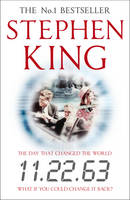Issue 274 of the BSFA’s critical journal Vector arrived in the post just before Christmas. It was a very special moment for me, because this issue contains my first published piece of criticism about books: a look at how two contrasting collections of linked stories (one, Nina Allan’s The Silver Wind, speculative fiction; the other, David Vann’s Legend of a Suicide, not) treat what might be termed ‘alternate worlds’. I was pleased with how the piece turned out, and hope to be able to republish it online at some point.
For now, however, I will leave you with the review that I also have in this issue of Vector, of Stephen King’s time-travel novel, 11.22.63:
Stephen King, 11.22.63 (2011)
 There’s a portal leading to 1958 in the storeroom of Al Templeton’s diner. No matter how much time someone spends there, only two minutes will have elapsed in the present when they return. Their actions in the past may altered the present – but all will be reset if the portal is used again. Al has tried to change the course of history by preventing the assassination of John F. Kennedy; but cancer caught up with him before he could wait out the necessary five years. Back in 2011, he enlists teacher Jake Epping to go back and do what he couldn’t.
There’s a portal leading to 1958 in the storeroom of Al Templeton’s diner. No matter how much time someone spends there, only two minutes will have elapsed in the present when they return. Their actions in the past may altered the present – but all will be reset if the portal is used again. Al has tried to change the course of history by preventing the assassination of John F. Kennedy; but cancer caught up with him before he could wait out the necessary five years. Back in 2011, he enlists teacher Jake Epping to go back and do what he couldn’t.
JFK’s murder may be the impetus of its plot, but the main focus of 11.22.63 for much of its length is Jake’s experience of the past: his realisation that he quite likes it back there, and his personal relationships, especially in Jodie, the small Texas town where he eventually settles and falls in love with a librarian named Sadie Dunhill. This strand has its moments, but in many ways it’s the least interesting aspect of King’s novel: as a character, Jake is rather anonymous – which is part of what helps him slot into 1958, but it also means there’s less emotional interest when he’s not being driven by his mission.
Nor is there much friction between past and present in the novel. Jake sees signs of the period’s prejudice and bigotry, but never has cause to truly confront or engage with them. For King’s protagonist, the 1950s and ‘60s can, unproblematically, be a time when root beer tasted better and folks were friendlier. The odd acknowledgement of social attitudes that don’t sit well with Jake’s liberal sensibilities does not carry much force in the face of this living past’s seductive nostalgia.
There are intriguing hints throughout 11.22.63’s midsection that time itself its resisting Jake’s attempts to change history; this maintains tension over whether he will actually succeed. But it’s not until novel’s end that the time travel aspect comes right to the fore – and here the book unbalances, as the tone built up over 700 pages shifts more than once over the next 30. A historical domestic drama with overtones of a thriller becomes a compressed science fiction story, and the transition is too abrupt to work.
The characterisation of Jake also causes the ending to come unstuck. Up to that point, the protagonist has seemed mostly detached; now, he acts with a strength of feeling that we haven’t really seen before – that King hasn’t really earned on the page. What’s more, the closing shifts feel like an author trying to have his cake and eat it, backtracking on a commitment to an emotional position. It’s a frustrating end to an uneven novel.
Recent Comments